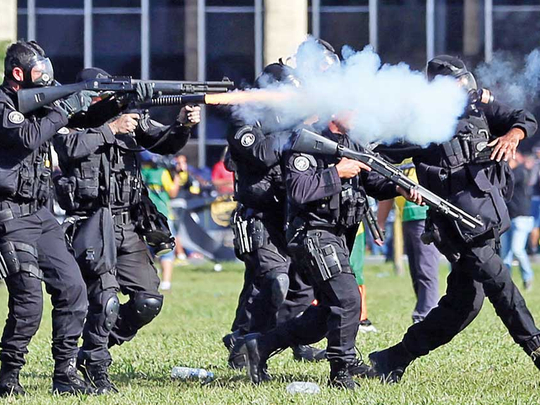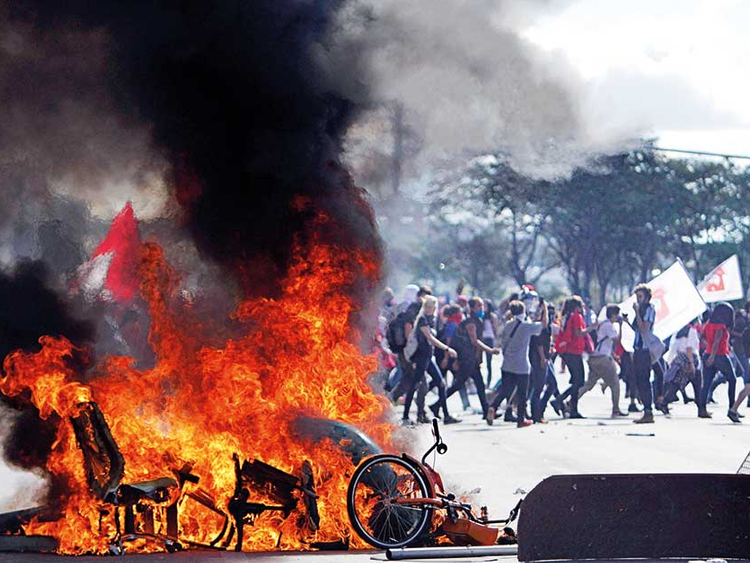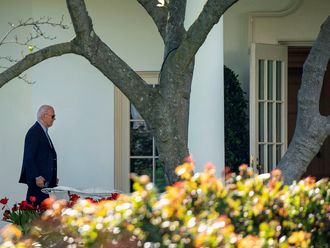
Brasilia: Brazilian soldiers deployed on Wednesday to defend government buildings in the capital Brasilia after protesters demanding the exit of President Michel Temer smashed their way into ministries and fought with riot police.
“At this moment, federal troops are already here in [the foreign ministry],” defence minister Raul Jungmann said in a brief televised statement. “And next there are troops arriving to secure all the ministerial buildings.”
Jungmann said the army was ordered in by Temer, who is fighting for his political life after being placed under a corruption investigation.
The deployment of soldiers sent a psychological shockwave through a capital already shaking from the day’s violence and frantic debate over the corruption scandal threatening to bring down the president.
In the lower house of Congress, the session was temporarily suspended after leftist deputies took over the speaker’s podium, brandishing signs saying “Temer out”.
Troops are regularly used in Brazil to back up police when law and order breaks down or help at major events like last year’s Rio Olympics.
The issue is deeply sensitive in a country that lived under military rule from 1964-1985, however, and the decision to bring soldiers into the heart of the government complex spooked even Temer’s allies.
“The question of a military presence is always something that frightens us,” said Tasso Jereissati, president of the PSDB social democrats.
Violence erupted soon after the crowd, estimated by police at 35,000, marched toward the presidential palace, which is flanked by Congress and the government buildings.
Although most of the protesters were peaceful, small groups wearing masks threw stones at officers ringing the area and smashed their way into the agriculture ministry and reportedly also the culture and planning ministries. Riot police crouching behind black shields lobbed tear gas and stun grenades into the crowd, triggering running battles.
When protesters set a fire in the agriculture ministry, employees were forced to flee.
“There was an invasion of the ministry’s private entrance. They lit a fire in a room, broke photos in a gallery of ex-ministers and confronted police,” a spokesperson for the ministry told AFP. “The building was evacuated.”
Jungmann said the protest had been “peaceful but descended into violence, vandalism, disrespect, attacks on state property, and threats against people”.
Government employees “were terrorised”, he said.
According to a count released by authorities, the day of protests resulted in 49 injuries and seven detainees.
Organised by leftist groups and trade unions a week after he was placed under a corruption probe, the protests are calling for Temer’s resignation.
Protesters also want the end of austerity reforms centered on cuts in the country’s generous but unaffordable pension system.
The left smells blood just over a year since Temer took over from Workers’ Party president Dilma Rousseff after she was impeached for illegally manipulating government accounts. Opponents say Temer could soon be forced to resign or subjected to an impeachment trial.
“It’s the end of this putchist government. That’s why the people have taken to the streets,” said Francisca Gomes, 59, who came from Sao Paulo to protest and carried a funeral ribbon with the president’s image and the words ‘RIP Temer.’
Inside Congress, Workers’ Party senator Gleisi Hoffmann echoed those words, saying: “Temer will fall. Everyone says this government is dead.”
Temer insists the austerity reforms are already working and that more measures, especially pension reform, are needed.
Stuck in deep recession for two years, Latin America’s biggest economy is just now showing the first signs of returning to growth, although unemployment stands at nearly 14 per cent.
However, Temer has been on the ropes since allegations that he attempted to pay hush money to a jailed politician and was involved in bribery. The scandal follows a landslide of other corruption allegations against much of Temer’s government and Congress in a huge probe known as ‘Operation Car Wash.’
For now, the president is trying to shore up his congressional alliance to resist calls for his impeachment. He has said he did nothing wrong and will not resign.
But analysts say that intense negotiations are going on behind the scenes to find the least traumatic way possible for Temer to be eased out.
Because he has no vice-president, the constitution would require a 30-day period led by the speaker of the lower house, followed by an indirect election in which Congress picks a new president until after scheduled elections in October 2018.
Andre Cesar, a political analyst at Hold consultancy, said Temer “cannot survive”.
“He doesn’t have the minimum conditions for this. But how the end will come for his government is the question.”













